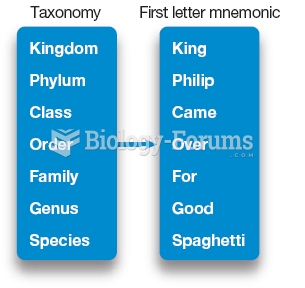|
|
|
Medication errors are more common among seriously ill patients than with those with minor conditions.
The use of salicylates dates back 2,500 years to Hippocrates’s recommendation of willow bark (from which a salicylate is derived) as an aid to the pains of childbirth. However, overdosage of salicylates can harm body fluids, electrolytes, the CNS, the GI tract, the ears, the lungs, the blood, the liver, and the kidneys and cause coma or death.
Congestive heart failure is a serious disorder that carries a reduced life expectancy. Heart failure is usually a chronic illness, and it may worsen with infection or other physical stressors.
The most common treatment options for addiction include psychotherapy, support groups, and individual counseling.
Earwax has antimicrobial properties that reduce the viability of bacteria and fungus in the human ear.







